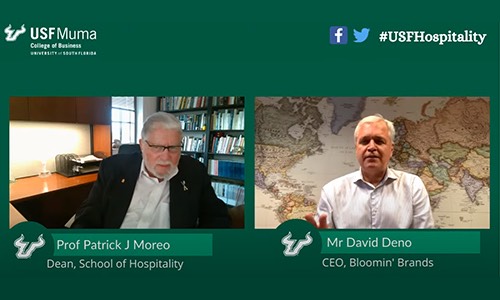The University of South Florida’s recent certificate program to help hotels, restaurants and other hospitality businesses navigate COVID-19 and pivot to the post-pandemic environment attracted thousands of hospitality professionals worldwide.
The free seven-week online series, offered by the university’s School of Hospitality and Tourism Management within the Muma College of Business, wrapped up on Dec. 18 after attracting more than 5,700 participants from 116 countries. Of those, nearly 4,400 attended all of the modules to earn course certificates.

Prof. Cihan Cobanoglu
“This was a huge success, and I really felt we did a very good thing in reaching out to the hospitality industry to offer a wide range of specialized courses and content to help during this unique and devastating crisis,” said hospitality Professor Cihan Cobanoglu, director of the M3 Center for Hospitality Technology and Innovation at the USF Sarasota-Manatee campus.
“Some people gave us feedback saying they found a job because of this, they found hope and that it gave them something to hold onto,” he said.
The National Restaurant Association reported that nearly one in six restaurants closed permanently or long-term during the pandemic, with nearly 3 million employees remaining out of work. A separate survey by the American Hotel & Lodging Association showed that nearly 63 percent of hotels have less than half of their typical, pre-crisis staff working full time.
“This program did not just talk about the crisis, but provided focused reflection and practical next steps for what the hospitality industry needs to do moving forward,” Pat Moreo, dean of the hospitality school, said.
Instructors from the school presented the program, which was organized by the M3 Center and held on Monday nights from Nov. 2 to Dec. 18. Participants were given the option of viewing the 70-minute online sessions live to interact with professors and ask questions or to watch the sessions afterward on YouTube. Quizzes were administered following each module, with topics ranging from hospitality marketing, human resource management and technology management to hospitality law and contracts, financial management and hospitality operations.
“Considering the changes in the business environment due to COVID-19, we decided to keep instruction in this program industry-focused,” said Assistant Professor of hospitality management Faizan Ali, who taught Digital Marketing and Customer Experience Management in the New Normal. “All of the modules were specially designed with a focus on data and insights from the industry to be able to discuss post-crisis best practices.”
The modules were open to anyone within the hospitality industry, including recently unemployed hospitality professionals looking to add new skills, mid- and senior-level professionals who want to prepare for a successful “reopening” of the economy, team leaders who want to become more effective, junior employees who want to position themselves as leaders, and entrepreneurs and small business owners who want a fresh perspective toward managing their businesses.
The sessions prompted strong positive feedback. Of the 1,262 who responded to a post-program survey, more than 95 percent reported they were “satisfied” or “extremely satisfied” with their instructors.
Among the participants’ comments:
“This was an amazing course. The USF faculty clearly spent much time and thought ensuring that we were presented a broad perspective. ... Their connections in the industry brought real-life and real-time solutions and mindsets. Thank you for offering this during such a difficult time for our global industry.”
“I loved this certificate program, the guest lecturers were fantastic and provided insights from a wide array of backgrounds. Everyone was engaging and passionate.”
“I found the USF Post-Crisis Hospitality Management program very engaging and well worth my time. It was so interesting to hear the experts in the hospitality field share their professional insights and how they have pivoted during this crisis.”
In addition to hospitality faculty, Cobanoglu was assisted by visiting scholars and industry executives who fielded questions, including Firehouse Subs CEO Don Fox, Bloomin’ Brands CEO David Deno and Kenneth Feld, chairman of Feld Entertainment.
“I’m very grateful to the faculty and everyone involved, including the M3 Center’s visiting scholars and staff, who worked over the Christmas break to go over the assessments and send out the certificates,” Cobanoglu said.
“I’m also pleased at the many thousands who enrolled in the program,” he said. “Almost half of the attendees were from Florida, and I think this program was very beneficial for our state. “It came at the right time and addressed what really is happening on the ground at a practical level. It felt good knowing that we were all working to make a difference. Also much thanks to Moez Limayem, dean of the Muma College of Business, for his leadership and support in starting this certificate initiative.”
To learn more about the USF Sarasota-Manatee campus, visit www.sarasotamanatee.usf.edu.
